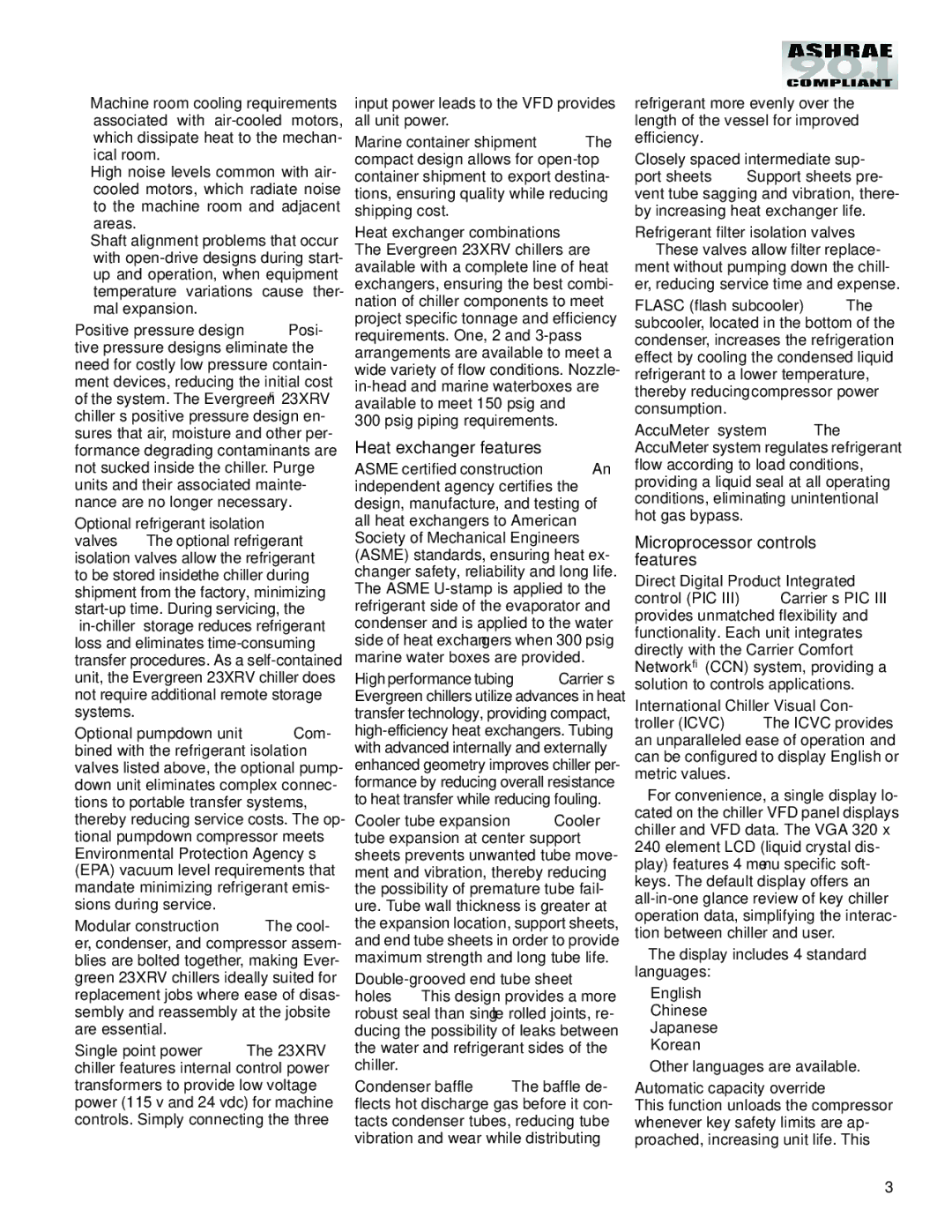•Machine room cooling requirements associated with air-cooled motors, which dissipate heat to the mechan- ical room.
•High noise levels common with air- cooled motors, which radiate noise to the machine room and adjacent areas.
•Shaft alignment problems that occur with open-drive designs during start- up and operation, when equipment temperature variations cause ther- mal expansion.
Positive pressure design — Posi- tive pressure designs eliminate the need for costly low pressure contain- ment devices, reducing the initial cost of the system. The Evergreen® 23XRV chiller’s positive pressure design en- sures that air, moisture and other per- formance degrading contaminants are not sucked inside the chiller. Purge units and their associated mainte- nance are no longer necessary.
Optional refrigerant isolation valves — The optional refrigerant isolation valves allow the refrigerant to be stored inside the chiller during shipment from the factory, minimizing start-up time. During servicing, the “in-chiller” storage reduces refrigerant loss and eliminates time-consuming transfer procedures. As a self-contained unit, the Evergreen 23XRV chiller does not require additional remote storage systems.
Optional pumpdown unit — Com- bined with the refrigerant isolation valves listed above, the optional pump- down unit eliminates complex connec- tions to portable transfer systems, thereby reducing service costs. The op- tional pumpdown compressor meets Environmental Protection Agency’s (EPA) vacuum level requirements that mandate minimizing refrigerant emis- sions during service.
Modular construction — The cool- er, condenser, and compressor assem- blies are bolted together, making Ever- green 23XRV chillers ideally suited for replacement jobs where ease of disas- sembly and reassembly at the jobsite are essential.
Single point power — The 23XRV chiller features internal control power transformers to provide low voltage power (115 v and 24 vdc) for machine controls. Simply connecting the three
input power leads to the VFD provides all unit power.
Marine container shipment — The compact design allows for open-top container shipment to export destina- tions, ensuring quality while reducing shipping cost.
Heat exchanger combinations — The Evergreen 23XRV chillers are available with a complete line of heat exchangers, ensuring the best combi- nation of chiller components to meet project specific tonnage and efficiency requirements. One, 2 and 3-pass arrangements are available to meet a wide variety of flow conditions. Nozzle- in-head and marine waterboxes are available to meet 150 psig and
300 psig piping requirements.
Heat exchanger features
ASME certified construction — An independent agency certifies the design, manufacture, and testing of all heat exchangers to American Society of Mechanical Engineers (ASME) standards, ensuring heat ex- changer safety, reliability and long life. The ASME U-stamp is applied to the refrigerant side of the evaporator and condenser and is applied to the water side of heat exchangers when 300 psig marine water boxes are provided.
High performance tubing — Carrier’s Evergreen chillers utilize advances in heat transfer technology, providing compact, high-efficiency heat exchangers. Tubing with advanced internally and externally enhanced geometry improves chiller per- formance by reducing overall resistance to heat transfer while reducing fouling.
Cooler tube expansion — Cooler tube expansion at center support sheets prevents unwanted tube move- ment and vibration, thereby reducing the possibility of premature tube fail- ure. Tube wall thickness is greater at the expansion location, support sheets, and end tube sheets in order to provide maximum strength and long tube life.
Double-grooved end tube sheet holes — This design provides a more robust seal than single rolled joints, re- ducing the possibility of leaks between the water and refrigerant sides of the chiller.
Condenser baffle — The baffle de- flects hot discharge gas before it con- tacts condenser tubes, reducing tube vibration and wear while distributing
refrigerant more evenly over the length of the vessel for improved efficiency.
Closely spaced intermediate sup- port sheets — Support sheets pre- vent tube sagging and vibration, there- by increasing heat exchanger life.
Refrigerant filter isolation valves
—These valves allow filter replace- ment without pumping down the chill- er, reducing service time and expense.
FLASC (flash subcooler) — The subcooler, located in the bottom of the condenser, increases the refrigeration effect by cooling the condensed liquid refrigerant to a lower temperature, thereby reducing compressor power consumption.
AccuMeter™ system — The AccuMeter system regulates refrigerant flow according to load conditions, providing a liquid seal at all operating conditions, eliminating unintentional hot gas bypass.
Microprocessor controls features
Direct Digital Product Integrated control (PIC III) — Carrier’s PIC III provides unmatched flexibility and functionality. Each unit integrates directly with the Carrier Comfort Network® (CCN) system, providing a solution to controls applications.
International Chiller Visual Con- troller (ICVC) — The ICVC provides an unparalleled ease of operation and can be configured to display English or metric values.
For convenience, a single display lo- cated on the chiller VFD panel displays chiller and VFD data. The VGA 320 x
240element LCD (liquid crystal dis- play) features 4 menu specific soft- keys. The default display offers an all-in-one glance review of key chiller operation data, simplifying the interac- tion between chiller and user.
The display includes 4 standard languages:
•English
•Chinese
•Japanese
•Korean
Other languages are available.
Automatic capacity override — This function unloads the compressor whenever key safety limits are ap- proached, increasing unit life. This
